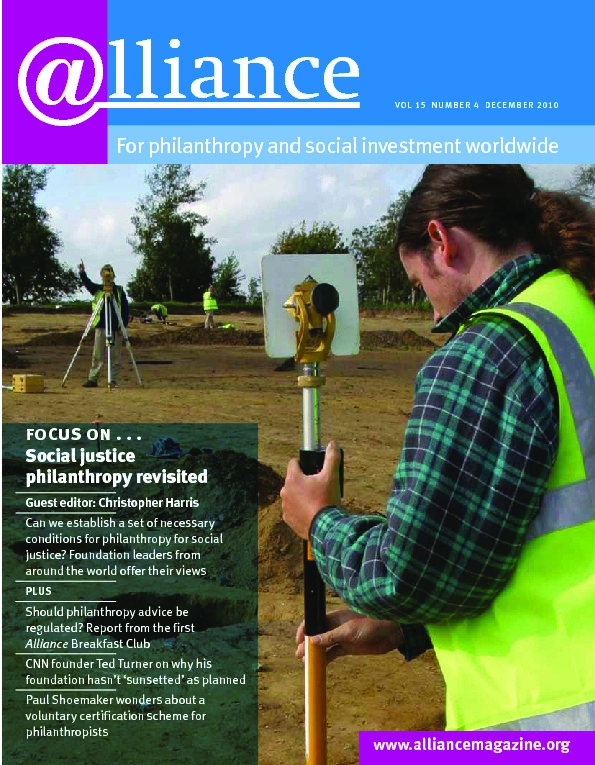Last winter, a so-called Israeli ‘student group’ launched an attack on the New Israel Fund (NIF). Despite NIF’s 32-year track record of building and sustaining progressive civil society, we found ourselves in the fight of our lives to protect our organization, in Israel and worldwide.
The attack was triggered by NIF’s human rights grantees providing eyewitness accounts of Israeli Defence Force (IDF) behaviour and misbehaviour during the 2009 Gaza war to the investigating UN commission, some of which found their way into the controversial Goldstone report.
 The ‘student group’ produced a well-funded report attacking us for disloyalty. Their report was eventually debunked, but other groups associated with the hard right continued the assault. They attempted to associate NIF with global BDS (boycott, sanctions and divestment), universal jurisdiction cases against Israeli officials, and rejection of the Jewish character of Israel. The accusations were dishonest: we oppose all of these positions. But, at a time when the Israeli public is highly sensitive to what is termed the ‘de-legitimization’ of Israel, they were still damaging.
The ‘student group’ produced a well-funded report attacking us for disloyalty. Their report was eventually debunked, but other groups associated with the hard right continued the assault. They attempted to associate NIF with global BDS (boycott, sanctions and divestment), universal jurisdiction cases against Israeli officials, and rejection of the Jewish character of Israel. The accusations were dishonest: we oppose all of these positions. But, at a time when the Israeli public is highly sensitive to what is termed the ‘de-legitimization’ of Israel, they were still damaging.
Almost immediately, the many supporters of NIF worldwide recognized these attacks as part of a calculated assault on the principles of Israeli democracy. (More than a dozen bills have now been introduced in the Knesset, threatening to defund, penalize or even criminalize civil society or otherwise restrict democratic freedoms.) We were symbolic of everything that outrages the ultra-nationalist Israeli right.
With our entire Israeli board and staff leadership in New York for our winter board meeting, our initial response was, to put it plainly, improvised. Our investment in communications and marketing, both in Israel and in the US, Canada and the UK, has always been small. But our senior staff, our board leadership and we ourselves had many years’ experience of advocacy and we learned, under fire, to become better advocates for ourselves. That meant reaffirming our commitment to our values, to our mission and to the conviction that what we do is valuable and necessary.
In practical terms, it meant creating a crisis communications team in both Israel and the US, exposing the attacks on NIF for what they were, not being shy in asking our friends to speak out for us, and doing the analysis necessary to understand the charges levelled at us and the way our own words and actions had been misrepresented. It also meant working closely with our more controversial grantees to present a united front that still allowed institutional autonomy for all of us.
Finally, it meant accelerating a process already under way, of better defining NIF and our goals. NIF has long been a ‘big tent’ – the first funder of civil society groups representing women and gays, Russians and Ethiopians, single mothers and the disabled, and Israel’s most marginalized minority, its Palestinian citizens. But we are associated with the left. Our values are progressive. We are not a neutral funder, and we have specific positions, including opposing the occupation and the settlement enterprise.
As we are the leading organization advancing Israeli democracy, our self-examination needed to exemplify the kind of society we ourselves would like to see in Israel. We started a process of dialogue that included our staff, board, friends, grantees and clients, and even some of our critics. We clarified and codified principles that we believe characterize our values and work, but which in a highly charged atmosphere involved careful thinking through intent and language. We applied those principles to the creation of more specific funding guidelines, institutionalized a policy mechanism, and more clearly defined NIF to our stakeholders and to the public at large.
The outcome of the attacks on NIF, and on progressive civil society in Israel, is still in doubt. On the positive side, the Attorney General of Israel has found no grounds to investigate NIF. The IDF has changed the way it operates, crediting the reports of human rights groups for information it needed to improve itself. When our ‘student group’ attackers went after academic freedom at a leading Israeli university, hundreds of Israeli leaders and academics protested and the group lost its largest source of funding.
We are continuing to expand our advocacy efforts, understanding that it is now as important a line of work for NIF as grantmaking or capacity-building. Thousands of new supporters have joined us in Israel and worldwide. Our notoriety has made us a better, stronger and more visible organization. Certainly not what our attackers planned.
But we’ll take it.
Daniel Sokatch is the CEO of NIF and Rachel Liel is its Executive Director in Israel. Email info@nif.org
For more information
http://www.nif.org






Comments (0)